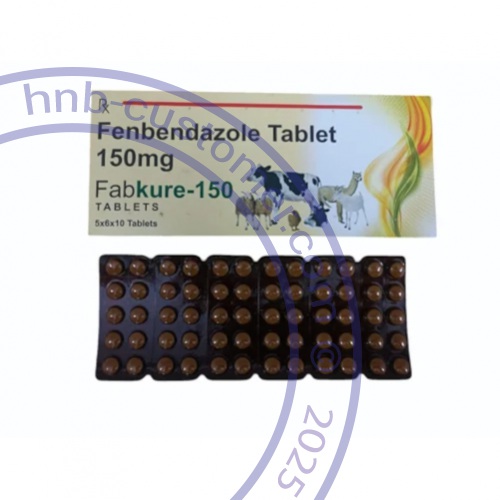

Brand(s):
Fabkure®
Manufacturer:
MOGON
Disease(s):
Giardia / Roundworms / Hookworms / Whipworms / The Tapeworm Genus Taenia / Dipylidium Caninum / A Common Dog Tapeworm) / Pinworms / Aelurostrongylus / Paragonimiasis / Strongyles
Fabkure®
- 150mg
-
Fabkure® 30 tablets$ 29.95
-
Fabkure® 60 tablets$ 39.95
-
Fabkure® 90 tablets$ 49.95
-
Fabkure® 120 tablets$ 59.95


Fabkure®
What Is Fenbendazole for Dogs and Cats?
Fenbendazole is the active ingredient in several common veterinary deworming medications for dogs and cats for the removal of intestinal worms including roundworms, hookworms, whipworms, and tapeworms, and protozoal parasites including Giardia.
Fenbendazole is FDA-approved for use in veterinary medicine to treat a wide variety of worms in horses, cattle, swine and goats. In dogs, it is FDA-approved to treat roundworms, hookworms, whipworms, and tapeworms.
Although fenbendazole is currently not FDA-approved as a veterinary medication in other species such as cats and ferrets, veterinarians can legally prescribe medications for use in other animals in certain circumstances. This is called extra-label or off-label use because this use isn’t described on the drug label.
In certain circumstances, your vet may recommend a compounded formulation of fenbendazole. Compounded medications are prescribed if there’s a specific reason your pet’s health can’t be managed by an FDA-approved drug, such as if your pet has trouble taking pills in capsule form, the dosage strength is not commercially available, or the pet is allergic to an ingredient in the FDA-approved medication.
Fenbendazole Considerations
Fenbendazole should be used with caution in pets that are hypersensitive to the medication.
Giving fenbendazole with certain medications can result in health risks to your pet, so it is important to discuss your pet’s medications, including vitamins and supplements, and medical conditions with your veterinarian.
It is important to note that fenbendazole does not treat all types of parasites, including the tapeworm spread by fleas. A different type of deworming medication may be necessary, especially if parasites are still present after treatment. Your veterinarian may perform fecal tests to ensure the medication is working and to determine if parasites are still present.
Check with your veterinarian about meat or milk residue requirements if you are using fenbendazole in food animals (cattle, goats, sheep, swine), as they can advise you on how long milk must be discarded and the length of time needed to wait before slaughter.
How Fenbendazole Works in Dogs and Cats
Fenbendazole blocks the ability of worms to produce energy, which ultimately starves and kills the parasite. Immature life stages, such as larvae or eggs, may also be affected in some types of worms.
Fenbendazole Directions for Dogs and Cats
Follow the directions on the drug label or as provided by your veterinarian. Fenbendazole is best absorbed if given with food.
Many puppies are dewormed after weaning at 6, 8, 10, and 12 weeks of age. The nursing mother dog should also be dewormed. Adult dogs may require deworming twice yearly or when parasites are present. Your veterinarian will determine a schedule that is appropriate for your pet.
Missed a Dose?
Speak with your veterinarian about what to do if you forget to give a dose of fenbendazole. Generally, they may instruct you to give it when you remember, or if it is almost time for your pet’s next dose, to skip the missed dose and resume your normal dosing schedule. Do not give extra or double doses.
Possible Side Effects of Fenbendazole in Dogs and Cats
When used as labeled, fenbendazole in dogs and cats is generally well tolerated, and side effects are uncommon.
The following side effects may be seen:
- Vomiting
- Excessive drooling
- Diarrhea
- Allergic reaction (anaphylaxis) including hives, facial swelling, lethargy, trouble breathing, or collapse
Seek immediate medical treatment if you suspect your pet may be having an allergic reaction. Contact your veterinarian if your pet is experiencing stomach upset.

















